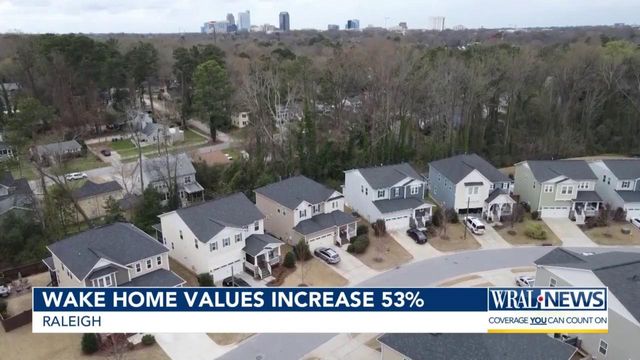Wake home values 53% greater than 2020; many homeowners will pay more in taxes
If the proposed revenue-neutral tax rate is adopted by Wake County commissioners later this year, some municipalities could see higher property tax bills. It includes homeowners in Apex, Cary, Fuquay-Varina, Garner, Morrisville and Wendell.
Posted — UpdatedWake County residential property values are up 53% compared to four years ago, according to revaluation numbers posted Friday by the county.
If the proposed revenue-neutral tax rate of $0.4643 per $100 of value is adopted by county commissioners later this year, some municipalities could see higher property tax bills. It includes homeowners in Apex, Cary, Fuquay-Varina, Garner, Morrisville and Wendell.
County commissioners don’t have to accept that proposal. They could ask for even more to fund schools, infrastructure and other public works.
Homeowners in Holly Springs will likely see their property taxes stay flat whereas homeowners in Knightdale, Raleigh, Rolesville, Wake Forest, Zebulon and unincorporated areas could see a decrease.
Property owners will need to compare the percentage change of their property value to the average percentage change for Wake County overall. If county leaders adopt a revenue neutral tax rate, there are three possibilities for how the new property values impact taxes:
- a) If your individual property’s value change was lower than the overall average change for property in Wake County: your taxes will likely go down. b) If your individual property’s value change was about the same as the overall average change for the county: your taxes will likely stay the same. c) If your individual property’s value change was higher than the overall average change in the county: your taxes will likely go up.
Property value percentage change by municipality:
- Wake County overall
- Residential change: 53%
- Commercial change: 43%
- Overall change: 51%
- Residential change: 57%
- Commercial change: 53%
- Overall change: 56%
- Residential change: 56%
- Commercial change: 39%
- Overall change: 51%
- Residential change: 54%
- Commercial change: 52%
- Overall change: 54%
- Residential change: 54%
- Commercial change: 59%
- Overall change: 56%
- Residential change: 53%
- Commercial change: 80%
- Overall change: 58%
- Residential change: 51%
- Commercial change: 67%
- Overall change: 57%
- Residential change: 55%
- Commercial change: 37%
- Overall change: 45%
- Residential change: 52%
- Commercial change: 43%
- Overall change: 48%
- Residential change: 51%
- Commercial change: 52%
- Overall change: 51%
- Residential change: 51%
- Commercial change: 50%
- Overall change: 51%
- Residential change: 63%
- Commercial change: 75%
- Overall change: 65%
- Residential change: 48%
- Commercial change: 50%
- Overall change: 49%
- Residential change: 52%
- Commercial change: 41%
- Overall change: 51%
“The property tax is based on equity and fairness, and values don’t increase at the same rate within neighborhoods, within communities from the west side of Wake County to the east,” Kinrade said.
Notices go out to Wake County homeowners next week.
Kinrade predicted Wake County would have an increase in property values in this four-year cycle compared to the previous.
To eliminate biases in assessments, Kinrade said the county partners with analytics company SAS to build artificial intelligence models to gauge the county’s assessments. The models provide another estimation to see if the county's assessment is in sync or if there are differences.
Wake County accepts informal appeals until March 1.
The deadline for formal appeals is May 15. In a formal appeal, a board hears appeals and property owners present their cases.
Raleigh NC 27602
As of Jan. 1, Wake County has 403,886 residential properties and 23,641 commercial properties.
Wake County’s commercial property values increased 45% compared to 2020, according to county documentation.
Wake County is estimating it will raise $1.4 billion in property taxes in fiscal year 2025, which runs from July 1, 2024 – June 30, 2025.
Property tax is Wake County’s largest revenue source, comprising of 72% of all general fund revenues.
• Credits
Copyright 2024 by Capitol Broadcasting Company. All rights reserved. This material may not be published, broadcast, rewritten or redistributed.






